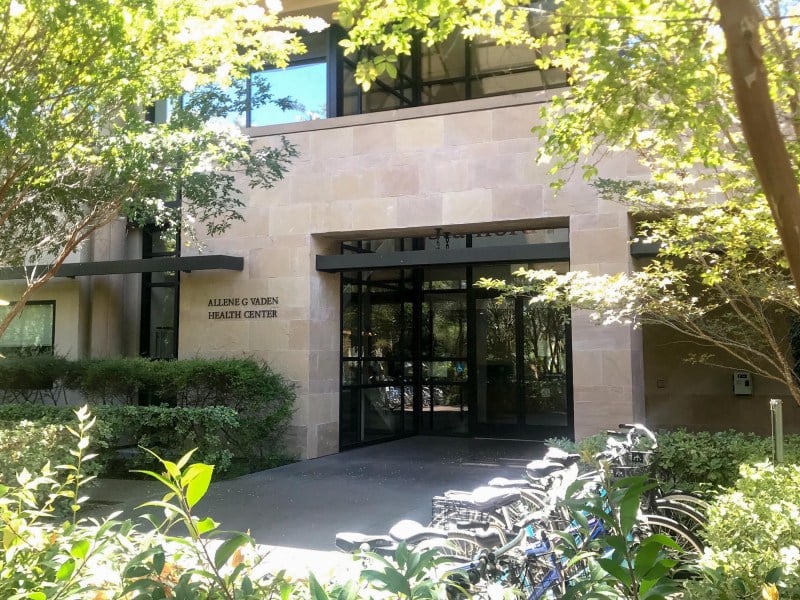This story contains references to suicide.
Last March, following the suicide of senior soccer captain Katie Meyer, Stanford publicly announced a commitment to increasing mental health resources for students. Seven months later, students and media outlets have criticized ongoing shortages and insufficient accessibility of services at Stanford’s Counseling and Psychological Services (CAPS), the primary mental health service for most students on campus.
In a Facebook post on March 8, Stanford announced that it was beginning “recruitment for additional permanent clinical counseling and therapy positions in both CAPS and the Department of Athletics, Physical Education and Recreation.”
As of Oct. 14, the University still has four open staff positions, wrote University spokesperson Pat Lopes Harris in a statement to The Daily on behalf of CAPS and the Office of the Vice Provost for Student Affairs.
“It is challenging to attract and retain clinicians in the current labor market, where individuals with relevant training and experience are in high demand,” Harris wrote. “We are working diligently to develop strategies, including conducting a compensation study. “
University officials also cited staff departures for the delay in filling positions.
“Most of the funding provided by The University in spring 2022 to hire additional CAPS clinicians has been used to create and fill positions, but we have also experienced attrition,” Harris wrote.
Vaden Health Services Senior Advisor for Mental Health and Well-Being Innovation John Austin told the Graduate Student Council on Tuesday that CAPS’ issues with worker retention stem from the high costs of living in the Bay Area as well as other opportunities to work remotely or independently.
Some students say that CAPS’s reputation for long wait times to schedule appointments deters them from using the service. Although CAPS has an on-call crisis clinician available 24 hours a day, normal appointments can take days or weeks to schedule in advance.
Anna Rose Robinson ’26, who called CAPS to set up an appointment on Sept. 6, said her appointment was scheduled for Oct. 7. Robinson said that while the process of setting up the appointment was simple, she later decided to cancel because she found outside resources available earlier.
Matthew Martinez ’24, who is on the men’s volleyball team, said that he decided to use his team’s assigned sports psychologist instead of CAPS in mid-spring quarter of 2022.
“I just had a lot of stuff going on in my personal life but it was the first time that I had felt my mental health was not in the right state,” Martinez said. “So I reached out to the sports psychology team just because given what I’ve heard about just the general student resources, I thought that I would get a much faster response.”
Martinez called the difference between resources for athletes compared to the general student population a “numbers game,” pointing out that there is a higher ratio of mental health staff in the Department of Athletics per athlete than CAPS staff for other students. Martinez said that for around 800 student athletes at Stanford, there are about eight sports psychology staff members.
As was recently reported in the San Francisco Chronicle, universities are recommended to have a ratio of one full-time staff member for every 1,000 to 1,500 students, per the International Accreditation of Counseling Services (IACS), an organization that accredits mental health services in many U.S. colleges.
Harris told The Daily that the University has “27.3 full-time equivalent CAPS staff clinicians at present,” with two half-time employees equating to one full-time employee. As of fall quarter of 2021, there were 16,937 total students at Stanford, with 7,645 undergraduates and 9,292 graduate students.
With one full-time equivalent staff member for every 620 students, Stanford CAPS exceeds the standards recommended by IACS, though is not an accredited center.
Outside of CAPS, Harris said there are also other therapists available at Stanford, including at the Department of Athletics, Physical Education and Recreation (DAPER), the Confidential Support Team, the Markaz Resource Center, the School of Medicine and the Weiland Health Initiative.
Some students have turned to The Bridge, Stanford’s student-run peer-counseling center, for another non-CAPS resource that they describe as a faster mental health service.
Sam Samani ‘26 said that he was facing one of the worst days of his Stanford career on Oct. 3, when he decided to Google “Stanford student mental health hotline” and came across Bridge Peer Counseling.
“I called, and they picked up in like five seconds,” Samani said. “I wanted advice from other students. I didn’t want advice from a counselor or another adult. It’s more comfortable that way because it’s anonymous.”
Students said that although alternative mental health resources can be effective, the shortage of resources at CAPS is still a concern, especially after pandemic-induced increases in stress and repeated instances of student suicides in the past two years.
“If Stanford has the resources for it, why not direct those resources towards mental health?” Martinez questioned. “Because in our generation, especially, we’re much more aware of mental health issues, and I think we’re more willing to reach out for resources. So given that demand, it makes sense for [the University] to supply more.”
Advocacy to improve the timeliness and availability of CAPS services has been happening for years. The Daily has reported inadequate CAPS funding since at least 2015. Campus groups including the Associated Students of Stanford University (ASSU) and the Undergraduate Senate have urged CAPS to hire more counselors and have criticized the University’s lack of quick action.
Despite that pressure, “I haven’t seen a change in the few years I’ve been here,” Martinez said.
